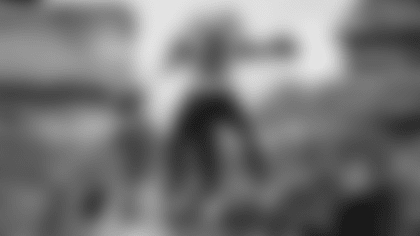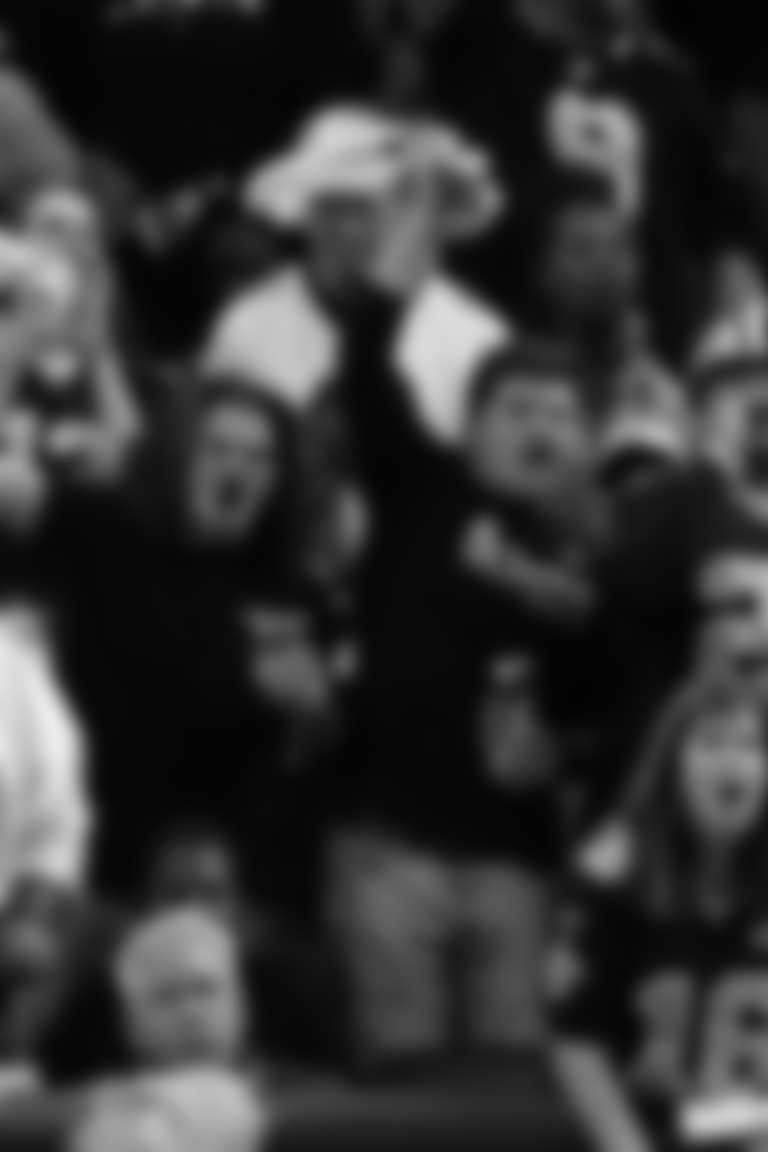New Orleans Saints head coach Sean Payton met with the media following a two hour practice on Thursday. In addition to an injury update, he remarked on the club's overall health at this point in time, discussed the defense's pass rush as well as how he likes his club to manage the pressure of games on an individual basis rather than looking ahead:
Opening Statement:
* *
"First off, there was one name that I didn't put on the injury report that was later put on the official list: Jon Stinchcomb had a bit of food poisoning but he was fine today. On our list today, running back Pierre Thomas (ankle) was full; running back Julius Jones (ankle) was full and tackle Charles Brown (back) was limited. It's just those three players. Most of the stuff today was nickel."
Are you satisfied with your pass rush to this point?
* *
"You're always looking at ways to improve it. Affecting the quarterback can come through your straight rush – your four-man rush, or it can come through pressures. So we're constantly paying attention to that, not only in the base but in the nickel. Our ability to hurry up the clock in that guy's head is something that we've done well and is something that we constantly work on. Each week we get another challenge. Sometimes you get a quarterback who is getting rid of the ball very quickly and is a tougher sack and you might elect to play a little bit more coverage, and other times you get guys that you feel like are a little bit easier targets. The player we're playing this week, although he's a rookie, is getting the ball out of his hands very quickly and very efficiently. So it will be a good challenge this week."
Is the release of the quarterback the main yardstick for deciding how much pressure you're going to bring?
* *
"You have to be smart in regards to your coverage or your pressure. But the release of the quarterback and that player specifically, has a lot to do with sacks. Obviously the protection and the experience and how well the offensive line is playing is critical, and yet there are some quarterbacks in this league that are tougher to sack because of their rhythm and their decision-making, their ability to get the ball out fast."
You've mixed it up both against young quarterbacks and experienced ones. Is that what you're striving for?
* *
"We'll always look to carry 'x' amount of pressures in a game. We value the importance of disrupting the timing of that position. That's something that from day one that we've emphasized of recognizing the importance of it, just as we do on offense recognize the importance of working your best not to be disrupted and changing the launch point, doing things that can help the protection. From the beginning, that's always a point of emphasis for us."
Did you have officials out there again today or was that just a one-day thing?
* *
"We had them out today as well."
Will you have them out again tomorrow?
* *
"The plan initially was just for yesterday and today but we might have them out tomorrow again."
Is that something where you call the league and they're available?
* *
"There is a local group that are available. They're not guys that are part of the NFL. Those guys that work the NFL games have jobs during the week – and I'm sure these guys do as well – but these guys are local officials that are available to come out and officiate within the NFL rules."
Do you ask them to look for particular things?
* *
"Yes. More than anything else it's a timeframe where they can communicate directly with the players between periods, saying, 'This is what I saw. You might want to watch this.' That dialogue during practice is good."
Is this a first for you to use officials during the season?
* *
"No, we've done that before. But it's the first this year."
Did they throw a lot of flags?
* *
"They'll throw a flag or two, but then after that more than just the flag they'll tell guys what to be careful of. It's more the dialogue. We're not actually stopping the practice if there's something that's taking place but it's the communication between the official and the defensive player, the offensive player or someone that's in the kicking game."
Do you think the holding penalties have increased because of the changing of the positioning of the umpire?
* *
"They have gone up statistically. Whether or not it's because of where the umpire is located probably can be debated and I don't know that I have a strong opinion either way. That being said, we just try to focus on the specific calls that we've been called on and finding if there is a common denominator, and generally it happens in the second phase of a run. More of them have happened in the running game. So what is it that we can do to prevent that?"
We had talked previously about the possibility of a team with fewer wins hosting a playoff game because they won their division. Do you remember what your stance was when that came up for a vote a few years back?
* *
"I just remember seeing the proposal; I don't know that it even came to a vote. Our league has great tradition so you always look closely when you look to change something like that. There is that value that everyone wants to put on winning your division and knowing that that secures a home playoff game. I think that by and large the room felt that way."
So that's never been one of your causes?
* *
"No, I think our format for playoffs has been very competitive and very efficient."
Do you remember having any opinion when Indianapolis was 12-4 and had to go to San Diego who was 8-8 a few years ago?
* *
"Again, I remember when that happened but I don't specifically recall it being anything. You understand the way that it's set up and you understand the importance of winning your own division."
There seems to be a perception that the NFC West is a weak division and oddsmakers have you as close to a 10-point favorite against a team that's leading that division this week. Do you have any thoughts on that?
* *
"I think 10 years ago people paid more attention to lines and I think people pay a lot more attention to the fantasy game now, which I think is one of the nice things about fantasy football for those that are interested in it. I was unaware and really don't pay much attention to that. We watch the tape; we look closely at who they've played and how they've played. Last night we spent a lot of time on their Atlanta Falcon game and that was a game that was hard-fought well into the second half. You can go on and on with who they've played and all we can concern ourselves with is the challenges that we think they present. We feel like those are very real. I think our players have had enough experience and know how hard it is to win in this league, period. It's not like college where you might get four games where you can pencil in wins in the beginning of the season; that's not the case in our league. There is a very fine line between winning and losing each week and having success in a season and not having success in a season. The league is set up that way and we see that every year and we see it right now. If you look at last year's playoff teams and where they're at right now, you see change. You see change in that landscape and the team that we're playing this weekend is a great example of that."
So is there a fine line between their 6-6 record and potentially being 8-4?
* *
"Yes. They're in a very hard race, just like we are. There's not anything different; they're in a race to win their division. You see that. They've played two good games on the road already and you've seen that throughout the course of the year. They're playing with confidence. That's what we try to pay attention to."
You've lost some guys to IR this year but in comparison to your previous four seasons here, is this the best shape you've been in coming down the stretch?
* *
"I would say that it is the healthiest we've been at this point in the season clearly. Just going back, if you looked at the number of player on IR this would be a lower number, and if you just look at this list today, it would be lower than what you would normally expect. The guys have handled the offseason well. You're always trying to put a finger on specific injuries and try to evaluate how you can be better in the offseason, how you can take a preventative role. Right now we're fortunate to be getting some guys back, to be getting a guy like Pierre Thomas. Really when you look at the injury list, it's relatively small as well as the injured reserve list."
Last year there were a lot of sports hernias and hamstring injuries. Did you do anything to change that?
* *
"You're paying attention to your offseason routine; the amount of running that you're trying to do. You're paying attention to your stretch program. Our offseason attendance has been outstanding and I think it stars with that. It starts with that commitment that the players have made, to their credit, of being here and being here through the workouts and getting their bodies in optimum shape for training camp and a long season."
Did you put in a new stretch program or anything?
* *
"No. Nothing like that."
You've had difficulties in December in recent years, going 2-2 or 2-3. What's different about playing in December? What makes it harder?
* *
"Number one, those numbers can be a little skewed because we've been fortunate enough to be in a position in '06 and last year to play December differently at the very last week. That being said, these are two important months. We just finished an important month and obviously the last four weeks of the season are critical, never more so than this year when you look at both the AFC and the NFC. You deal with weather, you deal with injuries, you deal with all those things that can contribute to or affect how you play. We look forward to that challenge."
So you don't really change anything at this point of the season?
* *
"I think you watch the reps. You watch and you reduce some of the snaps. I would say a month ago that I don't know that we're sitting here right at this minute; it's probably 10 or 15 minutes later. You make sure that you're cutting back some of the snaps and getting them off their feet a little earlier than earlier in the year."
You and Drew Brees seem to be loath to use the phrase "must win" unless it's a win or you go home game. Is that because you feel like the boy crying wolf if you do that too much that it loses its value?
* *
"Was last week a must win? And if it was, what's the difference between last week and this week? Or next week? In other word, they're units; they're wins. Each one of these carries an equal value in regards to winning and losing. I think that's why players and coaches look at it that way. Each week we try to focus on the next game. Certainly as seasons unfold there are games that appear to be more challenging or games that appear to carry more of a sense of urgency; when we played Pittsburgh that was an important game for us to play well. But I think by and large, coaches and players avoid that because a 'must win' would indicate that if you don't win that game then your season is over."
Is part of the disdain because the media labels it a "must"?
* *
"I don't know that it's disdain. It's really that it would be inaccurate. There were a lot of people that felt that we had to beat Carolina last year in the last game of the season. Many people said that we had to get a win and get our confidence back before the playoffs began because we had to. This was a must win game for the Saints, and that was inaccurate. Each week is important and we treat each week with that same level of urgency but you have to understand that it's the only game that we can play. I think there are games that become must wins and those would be games where if you win, you're in the playoffs and if you don't, you're out. That would be the appropriate time to say, 'This is a must win.' Then that would be fact."




















